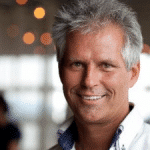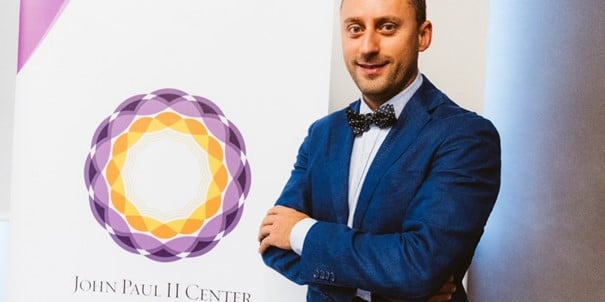
By Aart Bos l MasterPeace Leadership
Taras Dzyubanskyy is the MasterPeace club leader in Lviv- Ukraine. His passion is interfaith dialogue, he is a professor and well connected to the John Paul II Center.
How it all started
Taras started an initiative that brought together over 400 people online to discuss various topics related to the theme of interfaith dialogue. The initiative itself – the Interfaith Digital Caravan – was supported by the John Paul II Center for Interreligious Dialogue Leaders network. Altogether there were six webinars held since the month of June, engaging 15 speakers from different faith and religious traditions and bringing together participants from all over the world.
The Interfaith Digital Caravan
In the words of Taras, “The Interfaith Digital Caravan is a creative approach to the current COVID-19 crisis. The purpose of the initiative is to strengthen the spirit and hope by sharing stories, thoughts, and practices in an interfaith environment. Not only speakers shared their experiences, but also participants could ask questions and share their thoughts. Each webinar session became a digital platform where people from different countries, backgrounds, and cultures met and crossed boundaries in a virtual space, while the physical boundaries are closed due to the COVID-19 crisis.”
Solitude
The Interfaith Digital Caravan started in June with a webinar on the theme of solitude. Adam Afterman, director of the John Paul II Center for Interreligious Dialogue, raised a question: is solitude a spiritual value in Judaism? The Christian view on solitude was presented by Taras Dzyubanskyy. He organized a virtual tour to the Vatican Necropolis, the place of solitude and glory. The following discussion was moderated by Emily Judd, JPII Center media coordinator. The webinar started and finished with notable songs Hallelujah and Go down, Moses performed by Pavlo Tabakov, award-winning performer of the Voice Ukraine.
Spitual “battle” with the current pandemic
The second webinar was held in July. The main theme – spiritual “battle” with the current pandemic – was explored during a panel discussion and presentations by three speakers. The panel discussion on how Africa declares “war” on COVID-19 were conducted by Celestine Muonwe, James Miriago, Mak Caesar Abagna, Richard Gokum, and a moderator, Taras Dzyubanskyy. The following session of the webinar included stories from Auwal Farouk Abdussalam from the Kaduna state university and Raghda El Halawany from the MasterPeace Foundation. The idea of spiritual “war” on COVID-19 was revealed through the speech on jihad as a spiritual battle in Islam, and stories of the interfaith organization MasterPeace and its project Walls of Connection. The webinar included not only speeches and discussions, but also a live performance of sand art by Ilana Yahav.
A Journey through Sacred Scripture and Sacred Space
Dr. Catrian Williams and Dr. Angus Slater of the University of Wales Trinity Saint David also presented during the Caravan in August and in October, respectively. The topic of the session led by Dr. Williams was A Journey through Sacred Scripture and Sacred Space. Speakers and participants of the webinar discussed some biblical passages on the theme of the encounter and delivered a presentation on the symbolism of water in the architecture of ancient Rome. In October, Dr. Slater presented on “Academic and Pastoral Leadership in the times of COVID-19”. That session was co-led by Rev/ Jan Nowotnik, an alumnus of the JP2 Center and who currently serves as a National Ecumenical Officer at the Bishops’ Conference of England & Wales and secretary to the Departments for Dialogue & Unity and Evangelisation.
Final Caravan session
The final Caravan session took place on December 9 and featured Rabbi Jack Bemporad of the Center for Interreligious Understanding and Sri Svami Svatamannada who presented on “Identity and Interfaith Dialogue” from their respective religious traditions – Judaism and Hinduism. You can find all Caravan webinars here at: John Paul II Center for IRD (vimeo.com)

